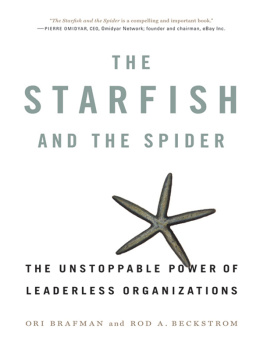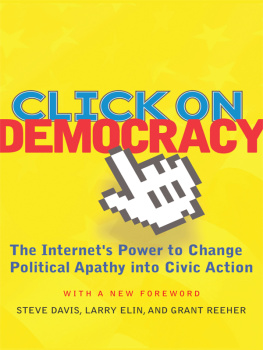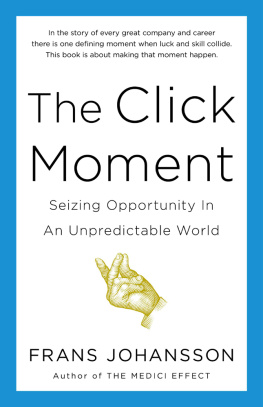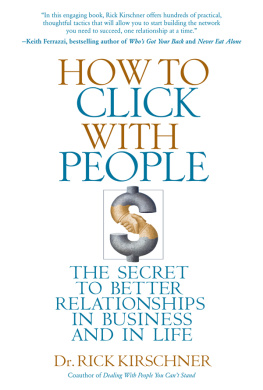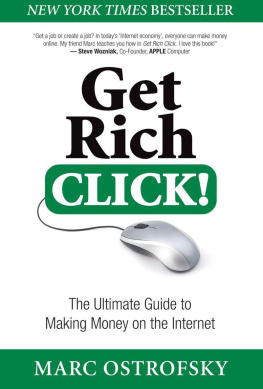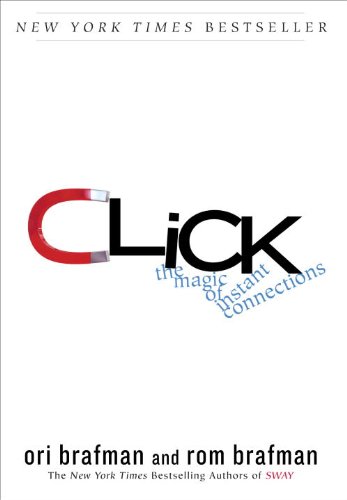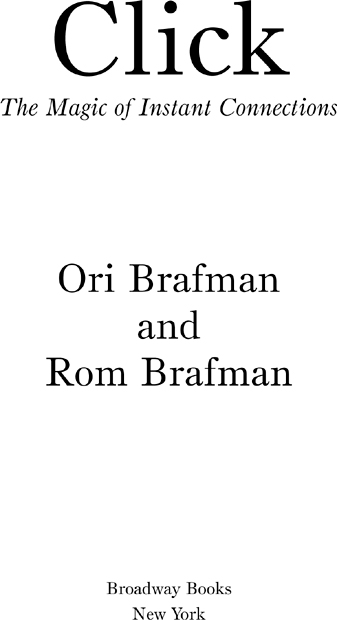Also by Ori Brafman and Rom Brafman
Sway
By Ori Brafman
The Starfish and the Spider (coauthor)
For John Buckley Roberts,
in loving memory
CONTENTS
CHAPTER 1
Finding Magic
S itting by the pool at a Pasadena hotel, Paul was about to do something impulsive, even by his standards.
The Southern California evening breeze was starting to pick up. Anyone within earshot of Paul and the woman sitting across from him at the poolside table would have thought theyd known each other for years, although the pair had met only two days prior. They talked about everything from world travel to the 1970s antiwar movement to Socratic philosophy; their conversation had a casual, easy flow to it. Watching the two of themNadia with her fine Mediterranean features and striking jet-black hair and Paul with his rugged, all-American looksone had a sense that they fit together. It was as if each was attuned to what the other was thinking. One moment they were laughing at embarrassing childhood stories and the next they were finishing each others sentences. If theres such a thing as synergy between two people, it seemed almost palpable here.
One would never have suspected that the two were ostensibly meeting for work. At the time, Paul was in charge of the proposal for a $15 billion project to clean up a nuclear weapons facility in Colorado. To help put the proposal together, Paul had assembled experts from around the world. The team had taken over an office building in Pasadena; the work was so intense that the office remained open 24/7. It was Pauls role to make sure all the countless moving parts worked together. But he was used to this level of intensity. A former officer in the armys special forces, Paul was trained to make split-second decisions, and he has the kind of personality people instinctively respond tohe is a natural leader. In conversation, he focuses intently on the other persons every word, making it clear hes fully present and is listening carefully.
Every morning at exactly 8:15 a.m., Paul assembled the top executives from the team to brief them about the strategy for the day. The meeting several days ago, though, had been different. From the beginning, Paul was keenly aware of the new team member, Nadia. I immediately thought, Who is that? He found himself instantly attracted to her. Nadias initial reaction to Paul seemed to be very different, however. It was her first day on the job. Her vacation in Paris had been abruptly cut short so that she could fly to Pasadena and take over as the projects chief operating officer. If that hadnt soured her mood enough, Paul made a comment during the meetingseemingly out of left fieldthat soured it further.
I uttered something about there being nothing new in human relations since the time of Plato, Aristotle, and Socrates, he recalled. I dont even remember why.
A few minutes later, as Paul stood before the group, he noticed out of the corner of his eye a folded note being passed from person to person. As he continued speaking, the note eventually made its way to him. He unfolded it and read the first line: I completely disagree with you. The hand-scrawled note went on for an entire page. But it was unsigned. He looked up, searching for a nod from the notes author. But all he got were blank stares. Only after the meeting had ended and the rest of his staff had filed out of the room did Nadia walk up to Paul.
Remembers Nadia, Here we havent met yet, and I just wrote him a note that said, I dont agree with you; what about the change in master-slave relations and relationships between men and women? There have been so many advances in society since then. How can you make such a comment? Id like to discuss this with you.
Paul, instead of becoming defensive, was intrigued. Id like to continue the conversation with you, he told her.
Anytime, she fired back.
Twelve hours later they were sitting by the pool.
They had told themselves that they intended to use the time not just to resolve the argument but also to delve into some important work issues. Work, however, never came up during their conversation together. Toward the end of the evening, the intensity of their interaction was difficult to ignore.
Are we going to end up getting in trouble? Paul asked Nadia, realizing that they were letting work get away from them.
Yes, she said simply. It was clear to her from the beginning that there was something special between them. The moment he made that comment about Plato and Aristotle, she told us, I knew. What we valued in life was very much the same, as were the things we thought were trivial. Whos outrageous enough to even bring up Plato and Aristotle in the middle of a strategy session? I mean, what does anybody whos in there know about Plato and the Greeks, or care about them? He had that courage to be different.
Having accomplished little of the work they had been planning to do, the pair decided to meet again the following night by the pool. And it was then that it happened. Paul looked at Nadia and asked, What would you say if I told you that I loved you and wanted to marry you?
Nadia retorted, Is that a hypothetical or is that an offer?
Paul said, Lets see what tomorrow brings.
Lets hit the pause button here. First, its worth noting that Paul and Nadia werent teenagers driven by hyperactive hormones. They were seasoned business executives. Like most of us, when they met a new person, they usually spent their first moments sizing each other up, searching for something to talk about: Where are you from? What kind of work do you do?
Occasionally, though, an introduction to someone new is more intense and intimate from the get-go. Maybe we share the same sense of humor or we admire the other individuals personality or passion. Or we immediately sense that we can just be ourselves around that person. Things feel right; we hit it off. There is an immediate sense of familiarity and comfort. Conversation flows easily, without embarrassing pauses or self-consciousness. In essence, we click.
This book is about those mysterious momentswhen we click in life. Those moments when we are fully engaged and feel a certain natural chemistry or connection with a person, place, or activity.
In its simplest terms, clicking can be defined as an immediate, deep, and meaningful connection with another person or with the world around us. Typically, it takes weeks or months before most of us feel truly comfortable with a new person. We have to gain the other persons trust, and he or she needs to gain ours. We need to find a common language, understand each others quirks, and establish an emotional bond. But sometimes this process is greatly accelerated, and the connection seems to form almost magically and instantaneously.
But this type of immediate, deep connection isnt limited to romantic love. Clicking can be equally deep and meaningful between future friends and can strike in the most unlikely of places.
For Jim West and Gerhard Sessler, a pair of physicists who first met at Bell Laboratories, the instant connection between them would permanently alter the course of their careers. But if you were to go back to 1959 and see the two when they first met, youd be struck by their apparent differences.
Jim, a tall, slender African American who grew up in Virginia during the Great Depression, learned from an early age to make do with whatever resources were available to him. As a black man, he reflected, I attended segregated schools. But I was lucky in that I had great teachers.


